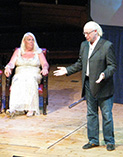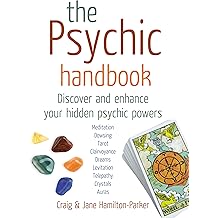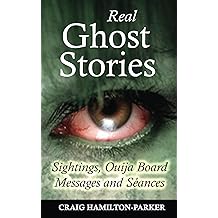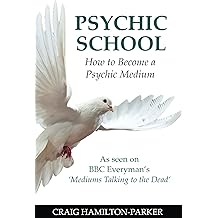How Do Mediums Talk with the Dead?
Communicating mind-to-mind in the spirit world.
Mediums talk to the dead using telepathy also known as mind-to-mind communication. The discarnate spirit projects their thoughts and feeling onto the mind of the medium and a spirit communication takes place. If the spirit spoke a different language to the medium, the thoughts projected by the spirit person are spontaneously translated into the medium's native language.
Thoughts are the language of the Spirit World
When you first arrive in the spirit world it will take you a little while to get used to using telepathy. At first, it will appear as if people are talking to you normally since this is the method of communication that you are used to. However, you will then notice that it only appears that they are talking. You are “hearing” their thoughts as spoken words. Similarly, you will notice that your own thoughts and feelings are completely transparent. The first spirit people you meet will “hear” your words as the thoughts form in your mind and before the words leave your mouth.
The same form of telepathic communication is used to communicate with the material plane. Unfortunately, you will find that most of the people you may try to communicate with are completely oblivious to your communications. Some may interpret your thoughts and sense, see, or even smell you. However, if you want to get a detailed message across, you will need to find someone who is telepathic and, most importantly, is aware of the telepathic signals from you and your spirit friends.
How Mediums talk to the Dead
A medium is used by the spirit people as a vehicle for communication between the two worlds. Onlookers assume that the medium is able to see the spirit person standing near them and can hear their voice speaking to them. Some mediums encourage this belief by saying things such as “I can see so-and-so standing by you” or “he is saying such-and-such.” This is not actually true.
Mental mediums perceive the spirit communicator inwardly. When we say we hear a voice, it is an inner voice that we hear. You may hear a tune inside your head or remember the voice of someone speaking--this is very similar to the way mediums hear the spirit. The name given for this type of spirit communication is clairaudience. Intuitive clairaudience is a subtle condition that can be described as listening in to soundless words. The medium is aware of an impression of hearing, as word forms come into consciousness.
Similarly, a medium feels sensations when a spirit is communicating. For example, I may feel the physical conditions they had when on earth. I will sense which sex they are or get impressions of their personality. This sensing is called clairsentience. Finally, I may see mental effigies showing the events from the spirit person’s life, see their face, or perhaps see pictures of places that were important to them. This perception of images is usually called clairvoyance. (Strictly speaking, clairvoyance is defined by parapsychology as an aspect of extra-sensory perception in which an object or event is perceived without the use of the known senses.)
How Do Spirits Communicate?
When you are dead you may get the opportunity to communicate through a medium. A little learning now about the art of spirit communication may help you a great deal when you enter the next life.
A medium cannot make a spirit person communicate with them. We have to open our awareness and see what comes. I am not like an open telephone line to the other side. What happens is a form of telepathy, not between me and the person with me but between the person in the spirit world and me. I “see,” “hear,” and “feel” the spirit--you will remember that we call these faculties clairvoyance, clairaudience, and clairsentience. By putting these impressions together I am able to build a picture of the communicator and prove that the human personality survives death.
If you were dead, what would you say to a medium to prove it's you?
If you were a spirit person now, what would you say to someone you loved to prove that you are actually you? Imagine you find yourself on the spirit side of life and are able to use your mind telepathically. Suddenly you realize that you are aware (“hear”) of the thoughts of a medium asking his or her spirit guides for help in communicating. You may even sense the medium’s anxiety about getting the facts right. Surrounding you, the medium’s spirit guides and helpers are ready to help you project your thoughts--to use your mind to influence the medium’s mind.
When you send a thought to the medium, you quickly learn that he or she is not a clear channel. Although you can communicate with full clarity telepathically with other people in the spirit world, it is a difficult process communicating with the living. You may say (or rather think) “My name’s Jack,” but as soon as the thought is received, the medium’s own mind alters it.
“Mac?” the medium’s mind offers as a message. “Is this part of the name? Or someone who used an Apple Mac computer? Or loved Big Mac hamburgers?” You immediately realize it is not going to be as easy as you thought. In a way, it’s like the party quiz of a spoken message passed down a long line of people. By the time the last person gets the message, the meaning has almost surely changed beyond recognition. This is a particular problem for mediums who are just beginning or psychics who have had no or little mediumistic training. As mediumship skills advance, it becomes much clearer whether words and impressions received are actually spirit-directed or figments of the self.
To hear the spirit we have to still the mind.
Fortunately, communication between the worlds is not always as bad as the example given. Sometimes, if a medium is completely open and keeps a still mind, it is possible to convey thoughts with clarity. However, you will soon discover--the medium’s spirit guides will help you--that it is easier to plant ideas into the medium’s mind using feelings and images than words and numbers. You need to project your “personality” into the medium’s mind so he can relate to his sitter the type of person you are. Once this is accepted, you can also give him easy-to-see images or pictures of places and scenes from your life. What pictures and impressions would you give to prove that you are, indeed, you and not someone else?
The spirit guides will be aware of the medium’s interests and knowledge. For example, the medium may love music and have a wide musical knowledge. If this is the case, you may be able to project to him your favourite tune, or one of the tunes played at your funeral. A medium with a good knowledge of music is more likely to “get” the tune you are giving him. Similarly, if the medium has a good sense of direction and knowledge of geography, you may be able to more easily show him places that were important to you in life. A memory of the streets of Paris, France, may be recognized by the medium, who is then able to name this city as being significant to you.
The famous spirit healer Harry Edwards likened mediumistic communication to a violin: “If the instrument is a poor one, it is reflected in the musical tones that come from it. The result also reflects the musician’s intimacy and knowledge of how to use the violin. Give the master violinist a superb instrument, and the result is far different. Every good instrumentalist has to know his instrument, the feel of it, and this can only come through usage and experience. It is just the same as mediumship.”
Given the inherent difficulties associated with spirit communication, what could you provide to, as much as possible, specifically identify you as the spirit communicator? Supposedly, you can’t give your usual basic information (name, address, identification number) because the medium’s mind is not receptive to this type of information. With the communication limited to sensations and visual impressions, what could you give to the medium?
The Limitations of Mediumship
You would have to work within the limitations the mediumship naturally imposes. For example, the medium may be able to sense whether you were a man or a woman when on Earth. You could also easily project feelings of your stature and your physical mannerisms. The medium may even mimic these unconsciously as the sitting progresses. Similarly, you could give the impressions that you felt before you died. You may be able to project sensations that describe the progress of your illness and your passing. If there was an accident, you may be able to give the impression of travelling at great speed before a crash, falling from a height, or being hit by something. This type of impression is more easily perceived by the medium and translated into meaningful messages to the sitter. Of course, since your bodily death, you are free of pain and disease but the reality of it is likely to be something that is still very much on the mind of the sitter. Most importantly, evidence you are able to give about how you passed over can stand as proof that it is you communicating. You may also be able to give the sitter reassurance that you are now free of suffering.
While you are communicating, it is up to the medium to keep his mind as clear as possible and not interfere with or try to make sense of the impressions being sent to him. I have noticed, in my mediumship, that things go awry as soon as I attempt to “take hold,” interfering with the impressions I am getting. When I, in the midst of receiving mode, try to make logical sense of the pictures and sensations, I fall over. Quality mediumship is an uninterrupted, uncensored flow of information. As I jokingly, and rather grossly, tell my pupils: “Accurate mediumship is like verbal diarrhoea! Just let it flow.”
Proving the Survival of Your Personality
Your personality doesn’t go through a massive transformation when you go to the spirit. Actually, you stay comparatively unchanged. Some of your cherished beliefs may be undermined, but the fundamental qualities of your personality remain fixed. Sadly, you will not become a demigod, even though your loved ones on earth may begin to idealize you as such--no matter what they thought of you when you were with them--since now you have seemingly all-knowing messages to pass to them from the beyond.
No, grumpy old Uncle Bill will still be grumpy old Uncle Bill when he gets to the spirit world. If he was a grumbling old fart in this life he will remain so in the world beyond. The human personality doesn’t change very quickly during our earthly life and there are no sudden transformations either when we enter the spirit state. We may become more aware of our faults and have a clearer insight into ourselves and the mistakes we made during life, but the human personality itself remains relatively unchanged.
References and Works Cited
- Hamilton-Parker, Craig (2010) What To Do When You Are Dead Sterling imprint Barnes & Noble ISBN 978-1-4027-7660-1 (Languages: English, Dutch, Portuguese)


















